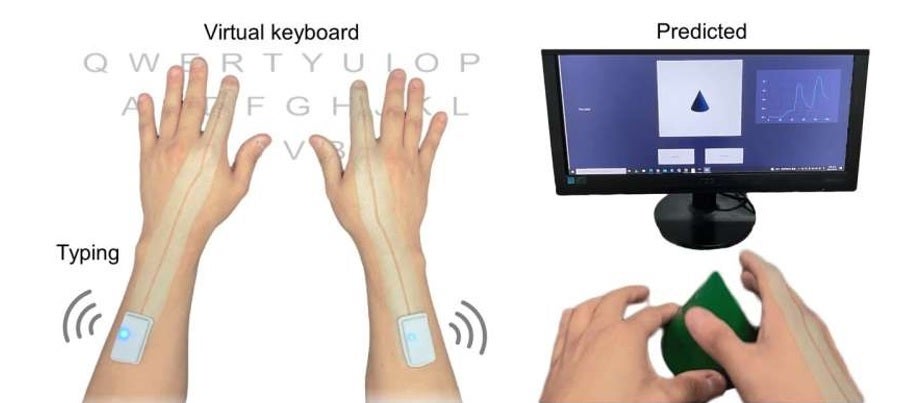Many smartphone users would love to escape the cramped QWERTY keyboard available on their handset and use a virtual QWERTY that might be displayed like a hologram on a table in front of them. These virtual keyboards could be the size of a QWERTY used on a desktop computer giving the user more space to type on. This would result in faster and more accurate text inputs typed by smartphone users.
Spraying on smart skin can allow you to use a virtual keyboard instead of your phone’s QWERTY
Zhenan Bao, a chemical engineering professor at Stanford and senior author of the study, said, “As the fingers bend and twist, the nanowires in the mesh get squeezed together and stretched apart, changing the electrical conductivity of the mesh. These changes can be measured and analyzed to tell us precisely how a hand or a finger or a joint is moving.”
The smart skin washes away with soap and water
Kyun Kyu “Richard” Kim, a post-doctoral scholar in Bao’s lab and the first author of the study stated, “We brought the aspects of human learning that rapidly adapt to tasks with only a handful of trials known as ‘meta-learning.’ This allows the device to rapidly recognize arbitrary new hand tasks and users with a few quick trials.” Kim added, “Moreover, it’s a surprisingly simple approach to this complex challenge that means we can achieve faster computational processing time with less data because our nanomesh captures subtle details in its signals,”
The smart skin contains mesh made up of millions of nanowires coated in gold and silver
Future use of this technology goes beyond smartphones, apps, and games. Surgeons would be able to spray the smart skin on their arms and control a robot surgeon in an operating room hundreds of miles away. The skin can also be used to touch an item and find out everything about that particular item. The Daily Beast likened this feature to a “wearable Google Lens” which is a good analogy.

Imagine using a spray-on smart skin to type on a virtual keyboard or to recognize items by touching them
Let’s look at how the virtual QWERTY would work. Using machine learning, an algorithm can learn the motion needed to type the letter “X” on a keyboard based on the patterns of electrical conductivity. Once the algorithm is “trained” to recognize the algorithm for all letters, numbers, punctuation, etc., the physical keyboard is no longer necessary. And this will open up the ability to type on virtual keyboards that might be easier and more accurate to type on than your phone’s QWERTY.

